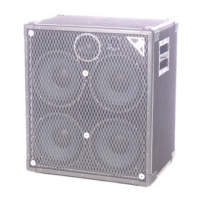on their sides, with the midranges and tweeters oriented on a common vertical axis. Acoustically, this
orientation offers a bett
er “line source” than stacking the two boxes upright or side
At first glance, the Low B
1 looks a little strange. As was mentioned above, the speaker uses a Fender
type strap handle. The port is apparently located o
n the top, next to the handle. Unusual.
In fact, however, the port and the handle are located on the
common surface to discourage the user from stacking another speaker (or anything else) over the port,
ining the operation of the port, and placing the woofer at great risk. As was mentioned in the
section on placement of the B
blocking the port(s) greatly reduces system power
As a consequence, the disadvant
age of this type of handle for use on the Low B
options, is a necessity on this smaller speaker, and allows
the use of this excellent handle on the B
Place the speaker with the midrange and the tweeter toward the top.
handle will be on the side, correctly, and the top of the box will provide an open surface for
placement of your amplifier, or f
or stacking a second Low B
As a design goal, internal system
resistance has been kept to a
minimum. To maintain the s
level of electrical integrity, short,
heavy gauge cables are best. Don't
run out and spend a fortune
what you have is inadequate. I
recommend a cable of under .3
Ohms, and the larger the cable the
e customers have successfully
speakers. This has led to the idea of
using the units elevated on s
stands. Be warned: There are only
two small places on the cabinet
where a recessed receptacle can be
where they are. To cut holes
anywhere else in the box will do
irreparable harm to the enclosure.
the special bracing that is used to
stress the enclosure. DO NOT CUT
HOLES IN THE ENCLOSURES FOR THE
STANDS WITHOUT CONSULTING
WITH US FIRST! If you need to do
this, please call before you destroy
Port Placement: Front, Rear, or Side?
Bass players seem to enjoy discussing the merits of front or rear placement of ports.
Based on their experiences, many players and manufacturers alike are convinced that
front placement has distinct advantages over
When asked to justify their opinions, these partisans will invariably refer to vague
and gut feelings. They will never talk about wave propagation or
Helmholtz resonation. In fact, a bass
port contributes to the system’s output, is a pressure device, as opposed to a wave
ction of the enclosure and the port, and the port's position with
respect to the woofer, itself, are unaffected by any direction
al activity. Direction is
utterly unimportant. By way of illustration, examine another pressure
inflate a balloon, does it expand on one direction only, or in all
Only after a port’s output leaves the c
abinet, and enters the environment, does it
assume the characteristics of a wave, one of which is direction of propagation.
Direction does assume importance when speaking of waves. Only, however, at
frequencies where the size of the source is large com
pared to the wavelength under
consideration. The highest frequencies at which the port in our Low
output have wavelengths of 14 feet or so. The speakers are
obviously quite small compared to these wavelengths, and the port ou
omnidirectional. Again, port placement is irrelevant to system performance.
2 have ports in the back? Be
cause that’s where they fit. Why does the
4 have its third port in the front? Same reason.
1 system could have been cor
rectly tuned with a shorter, smaller diameter port
located in either the front or the back, if location mattered. But it doesn’t
drawback would have been that at higher power levels, excessive port friction would
have resulted in diminished power hand
ling capability. This larger diameter, longer
port fits when installed on the side of the box. Plain and simple.
nds that the reason your B
1 system sounds so good is that the
tremendous innovation of a side
mounted port results in some type
leap in performance. In fact, the truth is much less exciting: a high
woofer in a solid and correctl
tuned enclosure. Feel free to let other people lose sleep
over where their ports are located. Now you know the truth.

